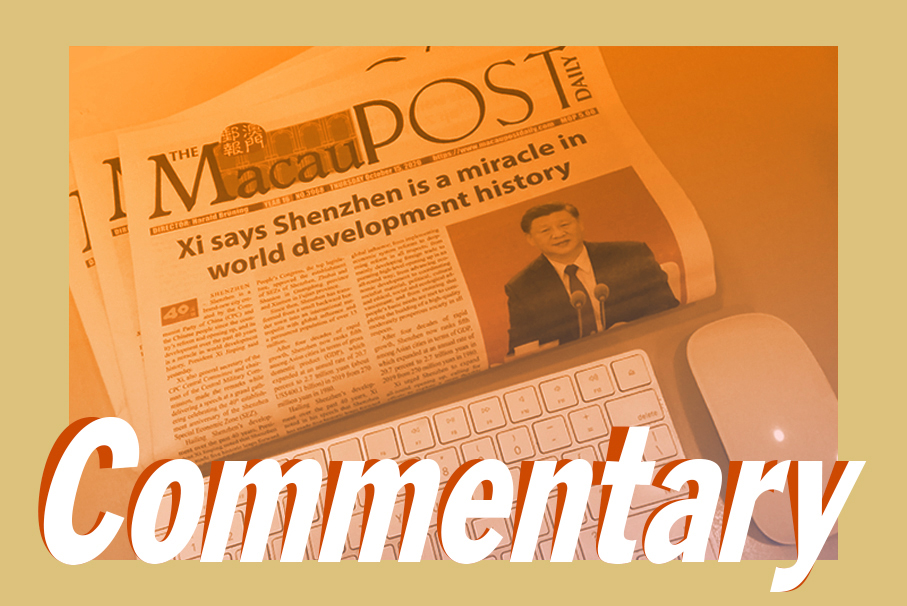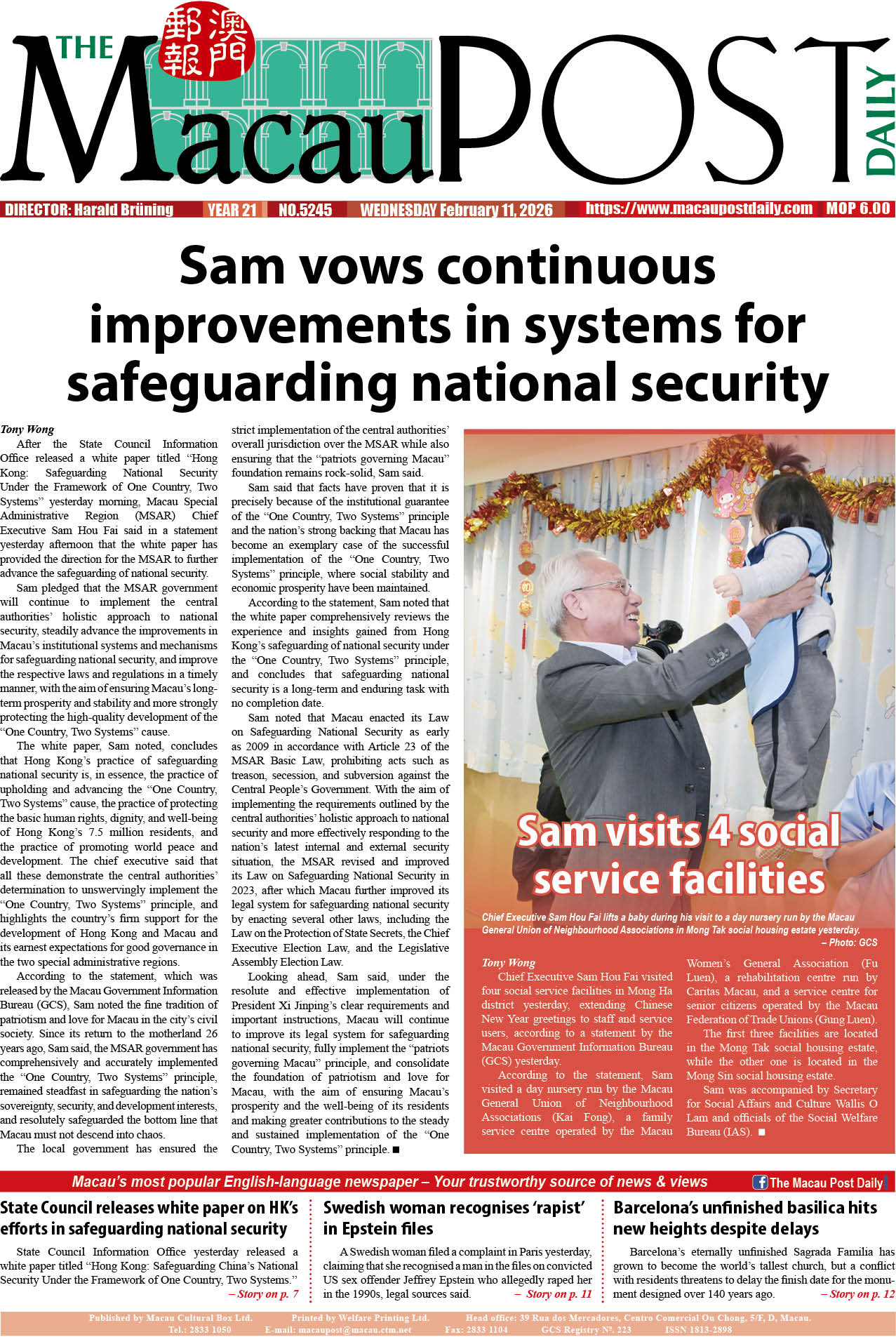Chief Executive-designate Sam Hou Fai’s 10 member-team, which was introduced to the public during a two-hour press conference at Government Headquarters in Nam Van yesterday morning, promised one by one, much to my satisfaction, a solution-focused and people-orientated approach.
This is in line with President Xi Jinping’s people-centred development philosophy which has benefited the nation for more than a decade.
It is also in accordance with Sam’s election manifesto, which stressed the importance of serving the population by tackling social and economic issues and focusing on solving their problems.
In his speech at the press conference, Sam underlined his team members’ proven patriotism, love of Macau, governance capacity, readiness to accept accountability and commitment to team spirit, among other aspects. He also stressed his team’s professionalism and hands-on experience gained over many years.
All his team members – nine principal officials and Macau’s chief public prosecutor – are public servants who have accumulated considerable experience in the Public Administration, law enforcement and Judiciary. Their age ranges between 40 and 64. The team includes three females, two of whom will head the Macau Special Administrative Region’s (MSAR) Commission of Audit (CA) and Commission Against Corruption (CCAC).
The team includes the government’s five policy secretaries who, according to Article 8 of the Government Organisation Framework Law, must be permanent residents who have lived habitually at least 15 consecutive years in Macau. Unlike for the chief executive, who must have lived habitually in Macau for at least 20 years and be aged at least 40 at the time of his or her appointment by the State Council, there is no statutory minimum age for the policy secretaries.
The newly appointed officials and the prosecutor general will take office on December 20, coinciding with the 25th Anniversary of the Establishment of the MSAR.
Unlike in the Hong Kong SAR, the MSAR’s principal officials do not include a chief secretary. The portfolios of Macau’s secretaries are subject to the policies formally delegated to them by the chief executive, who is assisted by an advisory Executive Council. The policy secretaries are listed in terms of the protocol order of precedence. In terms of political hierarchy, they are equals among equals.
According to Article 4 of Government Organisation Framework Law, the MSAR’s principal officials are its secretaries, commissioners against corruption and of audit, and those overseeing Macau’s police – the Unitary Police Service – and customs. Its Article 5 lists the government’s five secretariats and their order of precedence, namely for Administration and Justice, Economy and Finance, Security, Social Affairs and Culture, and Transport and Public Works.
While the number of secretariats is fixed by law, it is up to the chief executive to determine the bureaus and other public entities that each of them oversees, which may change over the years. For instance, in the past the Macau Government Tourism Office (MGTO) was moved – reasonably so, I think – from the Social Affairs and Culture to the Economy and Finance portfolio. It remains to be seen whether Sam has any such changes in mind for his upcoming administration. He and his nine principal officials as well as Macau’s chief public prosecutor will be solemnly sworn in on December 20.
Unlike in Hong Kong, Macau’s chief public prosecutor – the Public Prosecutor-General – is not a principle official of the executive but belongs to the Judiciary, according to Section 4 of the Macau Basic Law. Notwithstanding, his or her appointment is proposed by Macau’s chief executive to the State Council.
In order words, Macau is not ruled by a Cabinet but by a chief executive assisted by nine principal officials.
This system goes back to Macau’s years under temporary Portuguese administration when the Lisbon-appointed governor was the personification of the local government who was assisted by more than five “secretaries-adjunct”, whose number was limited at “no more than seven” by the Macau Organic Statute (EOM), in running the city.
When I asked one of Macau’s pre-handover governors how he would define the local government, he said: “Well, in all modesty, that’s me”. He asked me not to quote him by name. I will keep my promise.
Unlike governments elsewhere, Macau’s does not have a Cabinet. The job of the five secretaries and four other principal officials is to assist the chief executive, the “highest leader” of the MSAR, according to Article 2 of the Government Organisation Framework Law (formally known as Law No.2/1999), in implementing his or her policies. Macau has had executive-led political system since prior to the 1999 resumption of the exercise of Chinese sovereignty over the territory (Portugal had unilaterally relinquished its sovereignty shortly after its anti-colonial Carnation Revolution in April 1974, while China until December 20, 1999 had refrained from exercising it). That is to say, the chief executive is Macau’s policy setter. His principal officials are his or her policy implementers – nothing more, nothing less but still no mean feat.
Considering the CVs of the 10 officials appointed by the State Council on Saturday, I am convinced that, generally speaking, we can expect them to do well, which is what one would expect from them – executing Sam’s policy guidelines in an efficient, transparent and pragmatic way. There are loads of challenges that Macau is facing – its daily road traffic and public transport nightmare fraying the nerves of residents and visitors alike, public health and hospital services that require further upgrades (even though I do not have any adverse experience myself as far as our public health service is run, each time I am at the public S. Januário Hospital Centre, as a patient or visitor, I can’t help but wonder when it will undergo a major renovation, such as its rather uncomfortable waiting areas for patients and their families). The new government also needs, in my view, to speed up, as far as this is possible, Macau’s economic diversification, regional integration, talent acquisition and high-tech innovation processes, as well as help civil society develop an entrepreneurial spirit, considering that our economy has traditionally been dominated by merchants buying and selling goods, unlike entrepreneurs who, by taking financial risks, aim to develop new products and launch innovative services. The evolution of a culture of up-to-date entrepreneurship, such as by supporting high-tech startups, remains a major challenge for Macau’s future economic development.
Sam and his team will certainly face a raft of issues and challenges on the economic and social development front to get to grips with over the next five years. However, unlike their counterparts elsewhere, they won’t, I am quite sure, face political problems domestically. Loving China and Macau is a matter of fact for virtually everyone in Macau – including, as far as I known, the large majority of Macau’s expatriate community.
However, the ongoing international turmoil could, we must realistically admit, have an adverse impact on Macau’s stability and prosperity even in the short term. Let’s see how the Trump administration and Biden legacy, armed conflict in various parts of the world involving major powers and military alliances, will pan out over the next few years. All this could affect Macau’s external trade and tourism flows. That’s why national security matters and economic and financial policies must continue to be handled in a particularly prudent manner.
The best that the incoming Sam administration can give Macau is continued stability and prosperity in conjunction with careful planning to further strengthen Macau’s integration into the Guangdong-Hong Kong-Macau Greater Bay Area (GBA), including the Guangdong-Macau In-depth Cooperation Zone in Hengqin.
All this will need time to bear fruit. Macau people accustomed to their long-held view that everything must be “convenient” (“fongbihn” in Cantonese), i.e., conveniently close, easy and familiar, still need time to step out of their little comfort zone (33.3 km2) and accept the fact that their city has already become an integral part of a much larger area covering 56,000 km2 – the 11-city GBA. Even Hengqin (105 km2) alone is three times larger than Macau.
First and foremost, this is a psychological obstacle that needs to be overcome gradually.
I expect our future chief executive to keep a steady hand on the tiller. I regard strict organisational control and discipline as the sine qua non for successful governance.
Anyhow, I wish our future chief executive and his team all the best. And I also would like to thank the outgoing chief executive, Ho Iat Seng, and his team for their hard work during a particularly difficult term as three of his five years at the helm of the local government included the troublesome (that’s almost an understatement) COVID-19 pandemic that, after all, Macau managed to get through relatively unscathed.
– Harald Brüning









